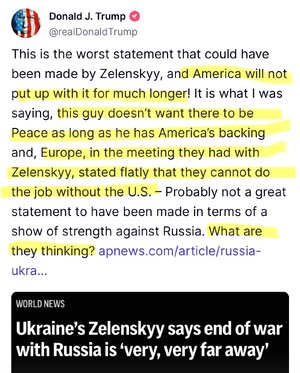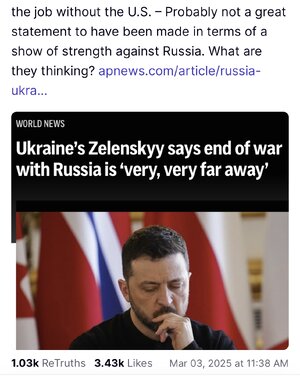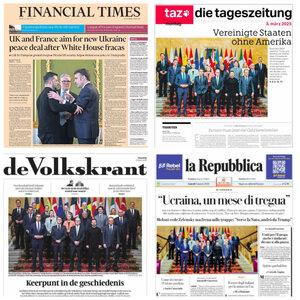From the AP article Trump linked:
“A deal to end
the war between Ukraine and Russia “is still very, very far away,” Ukrainian President Volodymyr Zelenskyy said, adding that he expects to keep receiving American support despite his recent
fraught relations with U.S. President Donald Trump.
“I think our relationship (with the U.S.) will continue, because it’s more than an occasional relationship,” Zelenskyy said late Sunday, referring to Washington’s support for the past three years of war.
“I believe that Ukraine has a strong enough partnership with the United States of America” to keep aid flowing, he said at a briefing in Ukrainian before leaving London.
Zelenskyy publicly was upbeat despite recent
diplomatic upheaval between Western countries that have been helping Ukraine with military hardware and financial aid.
…
Europe is suspicious of Trump’s motives and strategy. Friedrich Merz, Germany’s likely next leader after the recent election, said Monday that he didn’t think last Friday’s
Oval Office blow-up was spontaneous.
He said that he had watched the scene repeatedly.
“
My assessment is that it wasn’t a spontaneous reaction to interventions by Zelenskyy, but apparently an induced escalation in this meeting in the Oval Office,” Merz said.
He said that he was “somewhat astonished by the mutual tone,” but there has been “a certain continuity to what we are seeing from Washington at the moment” in recent weeks.
“I would advocate for us preparing to have to do a great, great deal more for our own security in the coming years and decades,” he said.
Even so, Merz said that he wanted to keep the trans-Atlantic relationship alive.
“I would also advocate doing everything to keep the Americans in Europe,” he said.“




